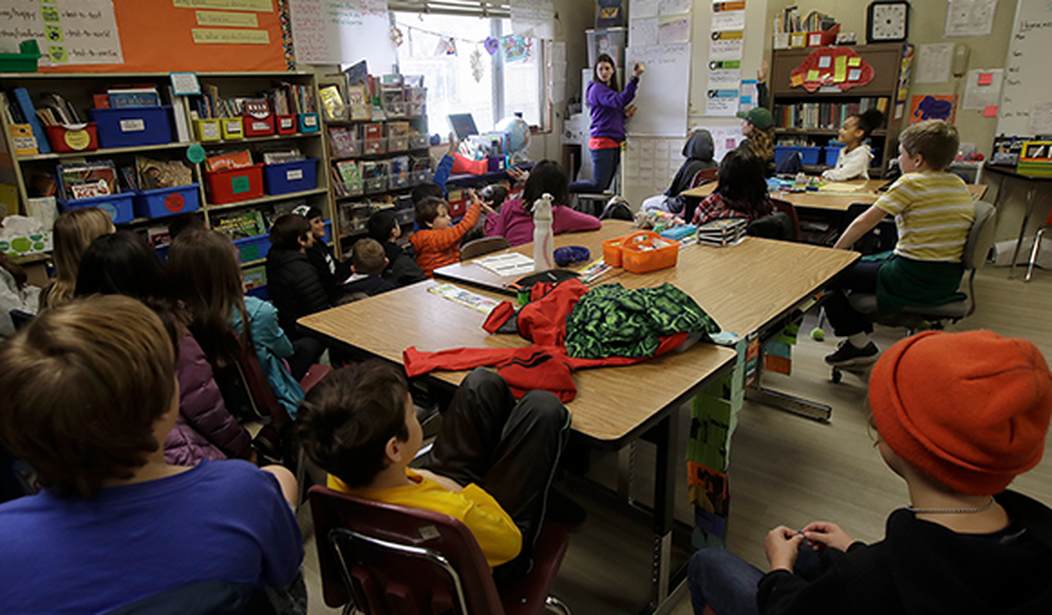You have probably already noticed that the left is big mad about the nationwide backlash against the progressives’ effort to infuse wokeism into the classroom. The public repudiation of Critical Race Theory (CRT) by legions of parents showing up at school board meetings has forced the left onto the defense – a place they are not used to being.
But the progressive crowd is still trying their darnedest to discredit those taking issue with the destructive material they insist on presenting to the nation’s children. Authors Andrew Atterbury and Juan Perez Jr. wrote a piece for Politico in which they argue conservatives are turning education into a partisan issue.
The authors wrote:
Republicans across America are pressing local jurisdictions and state lawmakers to make typically sleepy school board races into politicized, partisan elections in an attempt to gain more statewide control and swing them to victory in the 2022 midterms.
The authors point out that several states have approved, or are considering legislation to allow those running for school board to put their party on the ballot. They wrote:
Tennessee lawmakers in October approved a measure that allows school board candidates to list their party affiliation on the ballot. Arizona and Missouri legislators are weighing similar proposals. And GOP lawmakers in Florida will push a measure in an upcoming legislative session that would pave the way for partisan school board races statewide, potentially creating new primary elections that could further inflame the debate about how to teach kids.
The report notes that this trend “is about to spread to other states” because various conservative groups like the American Enterprise Institute are “urging conservatives to ‘strongly consider’ allowing partisan affiliations to appear on ballots next to school board candidates’ names.”
School boards in Florida were “among the last elected officials who blocked policies of Gov. Ron DeSantis,” according to Politico. The authors seemed disturbed by the notion that removing nonpartisan status among school boards “could break the last holdouts who regularly defy the governor.”
State Sen. Joe Gruters told the news outlet that Republicans are “trying to elect good conservatives that will follow essentially the governor’s mission as it relates to education.”
He continued:
“When you have a leader like DeSantis come out and say that there should be no lockdowns, if you have a Republican elected official, you would think they would probably give him the consideration and probably go along with what he asked.”
I wonder how the Politico authors would feel about a conservative school board member opposing the agenda of a Democratic governor?
Much of the debate over education is related to the level of influence people feel parents should have over the curriculum their children are being taught. This issue arose after parents realized their children were being taught inappropriate material on race. News reports telling stories about teachers and administrators facilitating lessons and exercises that assigned labels to individuals based on skin color frequently surfaced in the media. Parents became outraged after seeing lessons in which white children were labeled “oppressors” and “privileged,” while black and brown students were labeled as “oppressed.”
The left has been pushing a deceptive narrative arguing that people opposing these teachings are only trying to whitewash America’s sordid history of racism and discrimination. Progressive politicians and media activists are painting these parents as bigots who want to remove mentions of slavery and Jim Crow from the curriculum.
Despite the reality that most school boards are officially nonpartisan, the authors acknowledge that party affiliation is still prominent in school disputes. The wrote:
Texas Republicans this month announced the party’s plans to boost conservative candidates in nonpartisan school board and municipal elections. The party’s vice-chair described the effort as “one of the most consequential initiatives our party can undertake.”
Martin West, a professor of education at the Harvard Graduate School of Education, told Politico that making these races openly partisan could increase turnout, but also encourage more polarization.
“I do think party labels would produce more informed voters,” he said. “But, at the same time, it would likely accelerate emerging trend of nationalization of local education politics.”
This particular debate is interesting in that if conservatives get what they want, it will only serve to further highlight what people know already. While a particular candidate might not declare they are a Democrat, their party affiliation is typically known regardless.
Even here in Austin, our city council is technically nonpartisan. But when Mackenzie Kelly won her city council seat last year, it was clear a conservative had been elected. To put it simply, everyone in Austin knows she is a Republican and that the rest of the council are Democrats — even if they don’t have the “D” or “R” next to their name.
This renders the authors’ arguments moot.
The bottom line is that the issue of education has been politicized since before this current debate erupted earlier this year. Republicans and Democrats have always quibbled over education policy at the federal, state, and local levels. We are not witnessing anything new, and the notion that it is Republicans who are responsible for politicizing it is absurd on its face.
Indeed, one could easily argue that by trying to sneakily push progressive ideology into K-12 schools, without parents knowing, in many cases, it is they who have entered politics into the equation. Conservatives railing against this practice is simply a reaction to progressive politics being infused into education. But, as we already know, the truth doesn’t tend to matter to members of the activist media.














